NATO entering conflict in Ukraine would mean WWIII – European Council head

The EU “is not at war with Russia,” European Council President Charles Michel told El Pais in an interview published on Monday. Western nations should not get involved in the conflict between Moscow and Kiev, he said, arguing that a confrontation between Russia and NATO would mean nothing short of nuclear world war.
“Russia is a nuclear power and we are well aware that if this conflict turns into [a conflict] between NATO and Russia, we will roll down into the Third World War,” the former Belgian prime minister told El Pais on Saturday, following Friday’s EU summit in Versailles, France.
Michel advocated for dialogue, warning that “all conflicts are dramatic, extreme and often difficult,” but Russia’s nuclear capabilities add a whole new “dimension of a different nature” to any potential military standoff with Moscow.
“I advocate pragmatism,” he said, adding that Europe should focus on pressing issues at hand like humanitarian access to areas affected by the military action, the status of Ukraine’s nuclear power plants, and peace negotiations between Moscow and Kiev. “We need to talk to whoever is in the Kremlin today,” because “democracies” should talk to nations even if they are deemed “not democratic,” Michel said.
The EC president also said he has “regularly” spoken to Russian President Vladimir Putin personally, and “the history of our relationship” helps both leaders understand each other’s points of view, even if they do “not share them.” Michel believes, however, that it is not words, but a “change in the balance of power” that can contribute to progress in future negotiations. He added that Europe should not abandon the role of mediator in the conflict and “outsource” the role to an outside power, be it the US or China.
When asked if Russia should face “international justice” over what Kiev and Western nations call an invasion of Ukraine, Michel said there is no international “law without justice,” but said it is “up to the international organizations to say” whether Moscow should answer for anything.
Michel also said the EU is trying “to support [Ukraine] as much as possible” without “aggravating the conflict,” adding that Europe has already “broken” its own “taboos” by providing Ukraine with $1 billion in military aid.
However, Europe cannot grant Kiev everything it wants, he said, particularly when it comes to Ukraine joining the EU. “Enlargement is a sensitive issue, on which not all European countries have the same opinion,” he said, adding that the interests of other nations that have already entered the path to membership, such as Serbia, Albania, and Montenegro, should be considered as well.
Michel noted that the association agreement Ukraine and the EU signed in 2014 “has enormous potential that is underestimated.”
His comments come amid the ongoing Russian military action in Ukraine. Moscow attacked its neighbor in late February, following a seven-year standoff over Ukraine’s failure to implement the terms of the Minsk agreements, and Russia’s eventual recognition of the Donbass republics in Donetsk and Lugansk. The German- and French-brokered protocols were designed to regularize the status of the regions within the Ukrainian state.
Russia has now demanded that Ukraine officially declare itself a neutral country that will never join NATO. Kiev insists the Russian offensive was completely unprovoked and has denied claims it was planning to retake the two republics by force.














